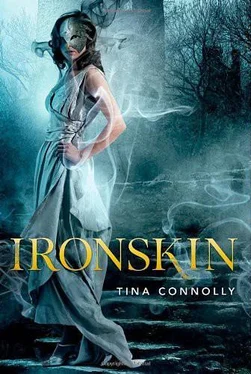Using her hands.
Lunch had been delivered while they were outside. Stewed beans and bowls of applesauce sat on two trays by Dorie’s room. Seized with a sudden impulse, Jane said, “We were going to try using a spoon today. Perhaps you’d like to watch.”
“Of course,” Mr. Rochart murmured. He did not come over the threshold, seemed poised to flee. But he stood, watching, and Dorie looked up at him expectantly.
“We’re going to try applesauce,” Jane said, and she set one of the blue-rimmed stoneware bowls in front of Dorie. She used the spoon to demonstrate eating a bite herself, then she held it out to the girl. “Now you try,” she said.
Dorie looked sideways up at her father, as if deciding whether to humor Jane. Mr. Rochart just stood, waiting patiently, so Jane carefully took Dorie’s arm and showed her how to lever her spoon into the applesauce and up to her mouth.
Jane let her hand fall away. “Now you try,” she repeated.
The presence of her father seemed to be the deciding factor in trying the new game. Dorie turned a look of intent concentration on her applesauce and carefully raised the spoon. As it neared her mouth she forgot to hold her wrist level, and the applesauce fell in a plop on her skirt. Immediately she turned her blank face to Mr. Rochart.
“Good try,” said her father. He reached down and wiped the blob from her dress. But to Jane he murmured, “I have seen her play the trained monkey before, when she wants something. But the minute your back is turned…”
“Baby steps,” said Jane firmly. She turned Dorie’s hand level again. The spoon still had applesauce clinging to it. “Try again.”
Dorie brought the spoon back, and after banging it into her chin, she slid it in. She sucked the applesauce off the end of it.
“Very good,” said Jane. “Much better. Let’s try it again.”
They got in two more bites, and then Dorie looked up at her father for praise.
He was no longer standing in the door. He had melted away. No doubt trying to avoid a parting scene, Jane thought in exasperation.
Which meant Jane was going to have to deal with the aftermath he shied away from.
Dorie’s face stayed blank, perfectly blank. Her hand opened and the spoon fell. Drops of applesauce spattered the clean floorboards.
“Oh no you don’t,” Jane muttered under her breath. She grabbed the spoon and put it back into Dorie’s hand. “Let’s continue to eat our applesauce,” she said. She attempted to close her charge’s fingers around the spoon handle, which was probably her first mistake.
Dorie glared, struggling to pull her palm out of Jane’s grip. She squirmed free and threw the spoon down. “Father!” she said.
“He’s gone!” said Jane, temper rising. “Let’s show him what a good job we can do.”
The bowl of applesauce rose off the floor and floated up to Dorie’s chin.
“No!” said Jane, and she pulled the bowl away. “No applesauce unless it’s with a spoon.” She wiped dust off the spoon and put it back into Dorie’s unwilling hand. Keeping her hand closed on Dorie’s, Jane maneuvered Dorie’s stiff arm toward the bowl. Carefully Jane scooped up one spoonful of applesauce with Dorie’s spoon and put it in Dorie’s mouth. “Good,” said Jane, letting go. “Now you try again.”
Dorie stared obstinately at the spoon in her hand. Then she threw it down, mentally yanked all the silverware off the tray, and set it whirling above Jane’s head in furious clanks.
“No!” Jane shouted. She pulled Dorie’s tray away, shoved it out into the hallway, and shut the door. She sat down beneath the whirling silverware and plucked it out of the air, one by one, until she had a fistful of spoons and forks. She kept her hand tight on the silverware and stared down at the little girl. Yanked the bowl of applesauce back in front of Dorie. “Try again.”
Dorie lifted the bowl of applesauce and dumped it on Jane’s head.
There was absolute silence in the room as Dorie stared blankly and stubbornly straight through Jane, and an angry Jane counted to thirty, willing her temper to calm.
I am not on fire, she told the hot orange rage that licked the mask around her cheek. I am cool water, putting out the fire. This little girl will not beat me.
Apple mush dripped around her ears.
At long length Jane rose slowly and went to her room. She changed her dress, ran a washcloth over her face and hair, drank a glass of water. Stared out the window for a while, considering her options.
When she returned, Dorie was standing at the window, looking into the forest.
“Dorie,” Jane said, then stopped.
The applesauce was neatly wiped off the floor and piled back in the stoneware bowl. All the silverware was tidily stacked next to it.
Dorie turned from the white-trimmed window. Jane could not tell if the blank expression was guilt or pretend innocence. She decided not to push it.
“Let’s listen to your gramophone,” she said.
* * *
A week later, Jane sat on the stairs for a while after her charge had gone to bed, leaning against the railing and thinking. In the twilight the foyer chandelier burned half-blue. One of its two mini-bluepacks had fizzled that morning, so half the foyer was dim, while the other half was decorated with blue sparks from the hanging crystal prisms. Jane absent-mindedly rubbed the bridge of her nose where the iron weighed down on it, watching the sparks dancing across the walls like tiny lights. Helen would like the way the chandelier sparkled. So would Dorie.
Dancing and walks. It was little enough to build trust out of, and Jane was reluctant to turn their only positive times together into rewards to be dangled overhead. She wondered if Mr. Rochart would have any ideas. She wanted to ask him—but he was always gone, and when he was there, like the day with Dorie and the applesauce, he melted away as soon as he’d appeared. Day after day he shut himself in the attic studio, or was mentioned casually as being “away,” though the motorcar remained in the carriage house. She knew all too well how much Dorie missed him. He had been at dinner twice during the month, and Dorie was much better the next day.
Down below in the foyer, Martha emerged from the forest green curtains, dragging a ladder backward that scraped on the stone floor. She wrestled it into place on the rug beneath the chandelier, tucked the hem of her skirt in her waistband to keep it free of her legs, and went up.
Jane did not speak, not wanting to startle Martha on the ladder, or embarrass her about her hiked-up skirt. But she wondered what the maid was doing—bluepacks didn’t have an empty container, a shell to remove. When they were gone they were gone. And with the rationing nowadays of the final stores left from before the war, when the bluepacks were gone they were generally gone for good. Hardly anyone had spares left to replace them. Mr. Rochart himself had said they were on the last of the big ones—the ones that would run a motorcar.
But Martha pulled a small bit of wiggling blue from her apron pocket and tucked it into the power source on the chandelier’s right side. Jane watched the motions that used to be familiar to everyone—pushing the blue stuff into the copper container (never iron, of course, or it wouldn’t work) with one finger, clapping the lid shut to keep the squirming substance in. It wasn’t that bluepacks tried to get free, exactly, but they did thrum and move in your hands.
Jane had dropped one, once, when she was young and changing the porch light. The old bluepack had fizzled that morning, bursting out of the copper cylinder that screwed into the light bulb, leaving the lid rattling on its hinge. Jane balanced on a kitchen stool that really wasn’t meant for balancing. She leaned wrong and had to grab the base of the light, opened her fist, and there went the bluepack. It hovered pretty much where she had let it go, as if it knew she owned it. But it was that pretty much that was the trick, since it made feeble darts up and back, as if attached by elastic to the spot in the air. Jane knocked the stool over twice more before she finally caught the bluepack and put it into place.
Читать дальше












